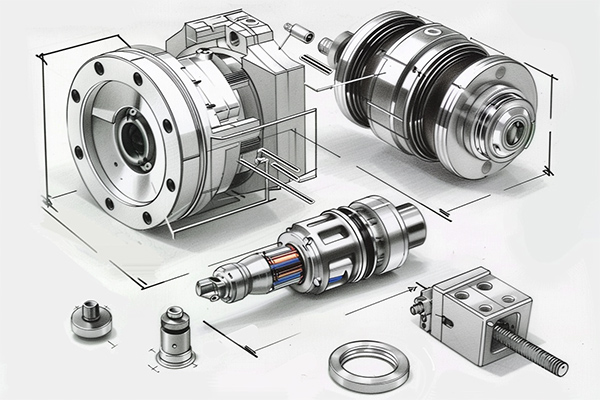Adaptive suspension systems are becoming increasingly prevalent in motorsport, offering precise control over a vehicle’s handling and stability. One of the key technologies driving these systems is the use of custom servo motors. These motors are designed to meet the exacting demands of racing environments, where even the smallest improvements in performance can result in a competitive advantage. In this article, we will explore how custom servo motors contribute to the performance of adaptive suspension systems in racing, and how companies like Gain Transmission are playing a pivotal role in shaping this technology.
Understanding Adaptive Suspension Systems
An adaptive suspension system is a type of advanced vehicle suspension technology that allows for real-time adjustments to a car’s shock absorbers, dampers, and spring rates. These systems dynamically respond to changes in road conditions, vehicle speed, and driver inputs, optimizing the ride quality and vehicle stability. In motorsports, where race tracks are often varied and unpredictable, adaptive suspension systems provide an essential advantage by allowing the suspension to adjust according to changing track conditions, improving both handling and comfort.
Traditional suspension systems, by contrast, have fixed shock absorber settings, limiting their adaptability to different racing environments. In contrast, adaptive systems provide the flexibility to change the damping characteristics on the fly, making them crucial for performance at high speeds, sharp corners, and on uneven surfaces.
The Role of Custom Servo Motors in Adaptive Suspension
Custom servo motor is central to the functionality of adaptive suspension systems. These motors are tasked with controlling the movement of the suspension components, adjusting them based on feedback from sensors embedded in the vehicle. The motors themselves must offer high torque and precision, as they are responsible for modifying the suspension settings instantaneously.
In the context of racing, custom servo motors must meet specific criteria:
High Performance: Racing vehicles operate under extreme conditions, including rapid changes in speed and terrain. Custom servo motors must be able to adjust suspension settings with lightning speed, responding to changes in just a fraction of a second. This rapid response ensures that the vehicle maintains optimal grip on the road, enhancing both safety and speed.
Precision: Adaptive suspension systems require high-precision control to fine-tune the dampers and springs. Even the smallest changes can have a significant impact on handling, so the motors need to operate with exceptional accuracy to ensure that the system delivers the right amount of adjustment in real-time.
Durability: The motors used in adaptive suspension systems must withstand the extreme environments of motorsports. High temperatures, intense vibrations, and high loads can quickly cause standard motors to fail. Custom servo motors are built to be incredibly robust, ensuring that they can operate consistently throughout the duration of a race, regardless of the conditions.
Efficiency: Racing teams aim to extract the maximum performance from every component of the vehicle, and servo motors are no exception. Custom motors must deliver high levels of power without draining excessive amounts of energy. They need to be optimized for weight, power output, and efficiency, ensuring that the vehicle remains light and agile while providing the necessary torque for suspension adjustments.
Adaptive Suspension in Racing: Performance Benefits
In racing, adaptive suspension systems equipped with custom servo motors offer numerous performance advantages:
Improved Handling: One of the primary benefits of adaptive suspension systems is their ability to optimize handling in various conditions. By dynamically adjusting to the track surface, these systems enhance the car’s grip, ensuring that tires maintain optimal contact with the road. This leads to better cornering ability and overall vehicle control, which is crucial for competitive racing.
Enhanced Stability: Custom servo motors enable real-time adjustments to the suspension, helping the vehicle maintain stability even at high speeds or during aggressive maneuvers. For example, if a car encounters a bump or uneven surface, the suspension can quickly adjust to absorb the impact, preventing loss of control or uncomfortable jolts for the driver.
Reduced Wear and Tear: By constantly adapting to changing conditions, adaptive suspension systems help to minimize unnecessary strain on the vehicle’s suspension components. This extends the lifespan of critical parts, allowing them to withstand the intense demands of racing while maintaining performance over time.
Increased Driver Confidence: In high-stakes racing, a driver’s ability to trust the vehicle’s performance is essential. Custom servo motors in adaptive suspension systems provide predictable and smooth adjustments, allowing drivers to push the vehicle to its limits with confidence. This can be especially important in high-speed or endurance racing, where split-second decisions and precise handling can determine victory.
Conclusion
The use of custom servo motors in adaptive suspension systems is a game changer in the world of racing. These motors play a vital role in improving vehicle handling, stability, and performance by making precise and real-time adjustments to suspension components. Racing teams rely on these systems to gain an edge on the track, and company like Gain Transmission is leading the way in providing high-performance motors that make it all possible.
As motorsports continues to evolve, the role of custom servo motors in adaptive suspension systems will only become more important. With their ability to adapt to any track conditions, these systems promise to revolutionize the way race cars handle, ensuring that every race is more exciting, faster, and safer than ever before.

